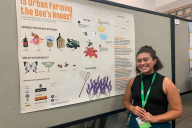You have /5 articles left.
Sign up for a free account or log in.

To help students navigate the transition to a four-year institution, community college leaders can organize a transfer fair.
SDI Productions/E+/Getty Images
Around one-third of students who enroll in community colleges in the fall transfer to a four-year institution, according to 2015 data from the National Student Clearinghouse cited in a 2024 report.
One of the greatest challenges to upward transfer is the complexity of the system, with universities having unique transfer processes, requirements and credit acceptance policies that can stall eager students from engaging in the transfer process.
To encourage students to transfer and help them in the process, colleges and universities can invite partner institutions to participate in a transfer fair, providing insight into the transfer process and helping students find an institution that meets their needs and goals.
What’s the need: Despite data indicating higher numbers of college students transferring from two-year colleges to four-year institutions, the success rate of bachelor’s degree completion among community college learners remains low.
Only 16 percent of community college students who started in 2015 successfully transferred to a four-year institution and completed a degree, up two percentage points over the past eight years, according to data from the National Student Clearinghouse.
Sometimes, colleges host a transfer fair not because students are moving on to a four-year institution, but because the institution is facing closure and students will have to complete their degree elsewhere. A transfer fair can provide an avenue for students to engage with transfer partners as they navigate next steps.
How it works: A transfer fair, similar to a career fair, typically takes place in-person with representatives from different institutions sharing information at a booth or table.
Western Kentucky University’s Owensboro Community and Technical College hosted a transfer fair that included WKU college officials, financial aid officers, the WKU transfer center staff and faculty to answer student questions and provide insight into what life at the university could look like.
Harper College in Illinois hosts three separate transfer fairs for students based on the institution type they’re looking to attend and their application cycles.
El Camino College in California puts on an in-person fair for University of California and California State University representatives and also participates in a virtual fair for institutions in the Western Association for College Admission Counseling system to give students a local and national perspective on transfer. WACAC’s virtual fair unites six to seven institutions of different sizes and states in a single webinar that students can watch live or on-demand.
Maximizing success: To make the most of the experience for students, higher education leaders and practitioners can guide students through best practices on attending a transfer fair, which include:
- Reflecting on personal goals and interests. Students may need to consider the size of the institution they want to attend, how it aligns with their own values and how their next college or university can support them in the future. Practitioners can encourage students to consider their next step carefully and how transfer aligns in that process.
- Engaging with representatives. Many students can feel unsure or hesitant to engage with a stranger from an unfamiliar institution. Teaching students the norms of how to behave at a transfer fair and appropriate questions to ask can ease their anxieties and make sure they have helpful conversations.
- Collecting contact and other information. After the transfer fair, students should feel equipped to go forward and engage with colleges independently or even to apply. Faculty, staff and administrators can remind students to get representatives’ business cards or emails for follow-up questions.
Colleges can also consider creating an FAQ or guidebook to help students. Harper College organized information to support students before stepping foot into the fair to help them make the most of their experience. Tri-County Technical College in South Carolina also created a list of questions students can use during the event.
If your student success program has a unique feature or twist, we’d like to know about it. Click here to submit.







.jpeg?itok=aGrC82hx)
